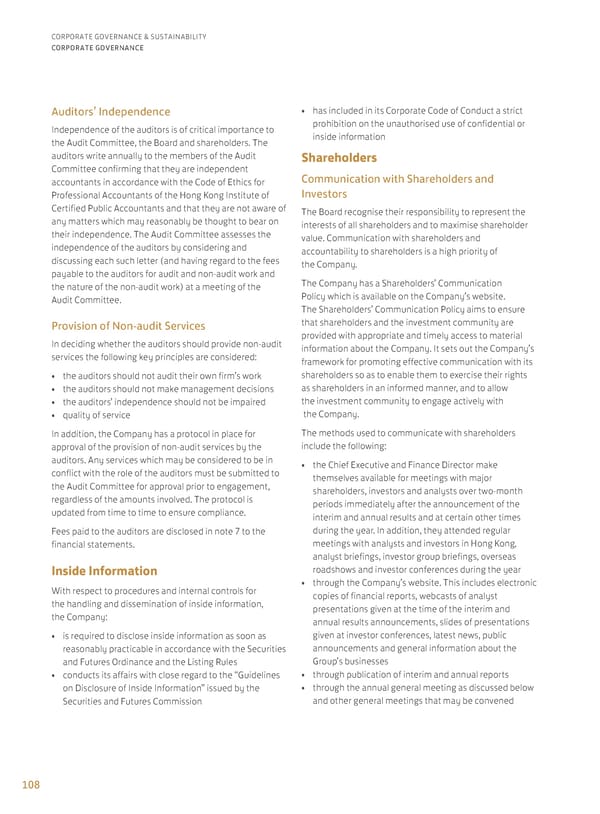108 CORPORATE GOVERNANCE & SUSTAINABILITY CORPORATE GOVERNANCE Auditors’ Independence Independence of the auditors is of critical importance to the Audit Committee, the Board and shareholders. The auditors write annually to the members of the Audit Committee confirming that they are independent accountants in accordance with the Code of Ethics for Professional Accountants of the Hong Kong Institute of Certified Public Accountants and that they are not aware of any matters which may reasonably be thought to bear on their independence. The Audit Committee assesses the independence of the auditors by considering and discussing each such letter (and having regard to the fees payable to the auditors for audit and non-audit work and the nature of the non-audit work) at a meeting of the Audit Committee. Provision of Non-audit Services In deciding whether the auditors should provide non-audit services the following key principles are considered: • the auditors should not audit their own firm’s work • the auditors should not make management decisions • the auditors’ independence should not be impaired • quality of service In addition, the Company has a protocol in place for approval of the provision of non-audit services by the auditors. Any services which may be considered to be in conflict with the role of the auditors must be submitted to the Audit Committee for approval prior to engagement, regardless of the amounts involved. The protocol is updated from time to time to ensure compliance. Fees paid to the auditors are disclosed in note 7 to the financial statements. Inside Information With respect to procedures and internal controls for the handling and dissemination of inside information, the Company: • is required to disclose inside information as soon as reasonably practicable in accordance with the Securities and Futures Ordinance and the Listing Rules • conducts its affairs with close regard to the “Guidelines on Disclosure of Inside Information” issued by the Securities and Futures Commission • has included in its Corporate Code of Conduct a strict prohibition on the unauthorised use of confidential or inside information Shareholders Communication with Shareholders and Investors The Board recognise their responsibility to represent the interests of all shareholders and to maximise shareholder value. Communication with shareholders and accountability to shareholders is a high priority of the Company. The Company has a Shareholders’ Communication Policy which is available on the Company’s website. The Shareholders’ Communication Policy aims to ensure that shareholders and the investment community are provided with appropriate and timely access to material information about the Company. It sets out the Company’s framework for promoting effective communication with its shareholders so as to enable them to exercise their rights as shareholders in an informed manner, and to allow the investment community to engage actively with the Company. The methods used to communicate with shareholders include the following: • the Chief Executive and Finance Director make themselves available for meetings with major shareholders, investors and analysts over two-month periods immediately after the announcement of the interim and annual results and at certain other times during the year. In addition, they attended regular meetings with analysts and investors in Hong Kong, analyst briefings, investor group briefings, overseas roadshows and investor conferences during the year • through the Company’s website. This includes electronic copies of financial reports, webcasts of analyst presentations given at the time of the interim and annual results announcements, slides of presentations given at investor conferences, latest news, public announcements and general information about the Group’s businesses • through publication of interim and annual reports • through the annual general meeting as discussed below and other general meetings that may be convened
 Annual Report 2024 | EN Page 109 Page 111
Annual Report 2024 | EN Page 109 Page 111